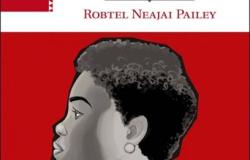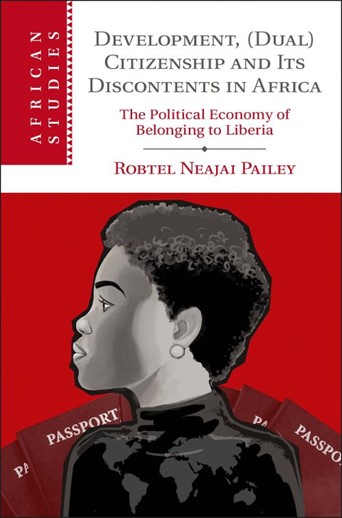Book Review - Development, (Dual) Citizenship and Its Discontents in Africa: The Political Economy of Belonging to Liberia

Development, (Dual) Citizenship and Its Discontents in Africa: The Political Economy of Belonging to Liberia by Robtel Neajai Pailey. Cambridge University Press 2021. 250 pp., £75 hardcover
In her seminal monograph, Development, (Dual) Citizenship and Its Discontents in Africa, Robtel Neajai Pailey presents a compelling overview of the contestations over citizenship and political economy in Liberia. Pailey uses the impasse over the recent dual citizenship bill as a heuristic in considering the contestations of Liberian citizenship. She traces the evolution of Liberian citizenship through a historical lens, focusing on transformative events, including migration, conflict, and post-war efforts that have shaped Liberian citizenship and its processes since the 19th century. In so doing, she argues that citizenship in Liberia has changed from being a largely passive exchange of rights and obligations that flowed directly from the state to the people.
 Pailey characterises citizenship as a triad consisting of three inter-related dimensions: the passive (which is of identity), active (practice) and interactive, which encompasses the relationship between civic, political and socioeconomic processes and constructions of citizenship. As such, citizenship is not a mere exchange of rights and responsibilities between individuals and the state, but it is a process embedded in practices and interactions; it has subjective and intersubjective dimensions that result in attachments of space and temporality in ways that transcend and complicate understandings of and meanings attached to citizenship.
Pailey characterises citizenship as a triad consisting of three inter-related dimensions: the passive (which is of identity), active (practice) and interactive, which encompasses the relationship between civic, political and socioeconomic processes and constructions of citizenship. As such, citizenship is not a mere exchange of rights and responsibilities between individuals and the state, but it is a process embedded in practices and interactions; it has subjective and intersubjective dimensions that result in attachments of space and temporality in ways that transcend and complicate understandings of and meanings attached to citizenship.
Pailey focuses on contradictions within citizenship: particularly on how it can be agentive and emancipatory while also being disempowering and exclusionary. For example, she describes how the controversial ‘Negro Clause’ was instituted by the state during a time when repatriated blacks had fled from economic servitude in the USA and Caribbean, to create a space where they would be the only sole owners of capital, land and means of production. This restructured the relationship repatriated blacks had with the state, in ways that reinforced and protected their agency with rights, in ways that had been obscured by the violence of slavery. Meanwhile, the ‘Negro Clause’ is enshrined in the country’s constitution and prevents all people who are not black from acquiring and attaining Liberia citizenship. This stipulation has contributed to an unevenness and exclusion from citizenship for groups, including the country’s long-standing Lebanese community, who have long and enduring socio-economic cultural ties to the country. With these examples, Pailey emphasises how deeply contentious citizenship was and continues to be in the contemporary period.
Also in this book, Pailey exemplifies the ways in which citizenship is contested and experienced differentially, across spatial scales. First, she introduces the reader to the contestations of citizenship and its related shifts and negotiations within Liberia with reference to the Mandingo-ethnic and the “Negro Clause”. The Mandigo are an ethnic group who are othered due to their faith in Islam, shifting migratory and trade patterns, and shared ancestry with others across the West Africa region. The author also highlights the ways in which Liberian citizenship is experienced in fragmented ways even within the diaspora, based on positionalities and spatio-temporal contexts. In this way, the author problematises the assumptions of a universal experience of Liberian citizenship, considering how citizenship within the diaspora and for home-landers is complicated and fragmented. These instances of contestation also raise important questions, particularly in thinking about ideals of authenticity - when thinking about who/what constitutes as an “authentic” Liberian, the pastoral dynamics that go into play in deciding this, and the assumptions embedded within this regarding political belonging in the state.
Moreover, in conceptualising citizenship as a triad and tracing its evolution in the trajectory of Liberian state development, Pailey challenges hegemonic and orientalising interpretations of the concept that treat citizenship as an import from Global North to the Global South. She does this by presenting a critical perspective on citizenship as an exclusive European value and by considering how we might (and must) begin to think differently about citizenship as political subjectivity. The commitment to navigate citizenship across continents adds a spatial element to the study, particularly in ascertaining how political subjectivities emerge and how people mediate this through space and time. The geographical scope of the research enables a discerning of diasporic and domestic variations and similarities in how actors conceive of themselves as Liberian citizens.
Pailey draws on an extensive collection of 202 interviews with domestic Liberians and the diaspora, within the capital cities of Liberia (Monrovia), Sierra Leone (Freetown), Ghana (Accra), the United States of America (Washington, D.C.) and the United Kingdom (London). The motivations for research within these metros is two-pronged. First, Pailey challenges the assumption that the Liberian diaspora is predominantly situated in cities in the Global North; she challenges the prevailing assumption of the brunt of Liberians opting for migration to cities in the Global North, particularly in the U.S. and the U.K., by accentuating Liberian migrants in neighbouring Ghana and Sierra Leone. Pailey also challenges the sentiment of the Global South being an obvious site of study, by underlining the narratives that exist in the Global North. In so doing, Pailey contributes to the work of critical citizenship that seeks to challenge pervasive and orientalising notions of citizenship being a Western invention that is purely embedded in binaries of inclusion and exclusion of others.
Overall, Development, (Dual) Citizenship and Its Discontents in Africa is a significant contribution in thinking about the ways in which Liberians in-country and the diaspora conceive of citizenship, how their contemporary constructions of Liberian citizenship deviate or cohere according to their lived experiences and socio-economic positions, and how they practise citizenship in the everyday. With rich qualitative data and analyses, the book is a wonderful contribution to the extant literature on politics and citizenship, particularly when considering its relational, spatial and temporal aspects. It is a work that is accessible beyond academic circles in and enlivened by Pailey’s unique and engaging tone. It is a timely and important piece of work that deserves deep and wide engagement.
Sibongile Zulu is a DPhil candidate and Abdul Raufu Mustapha Departmental Scholar in International Development at the University of Oxford.


